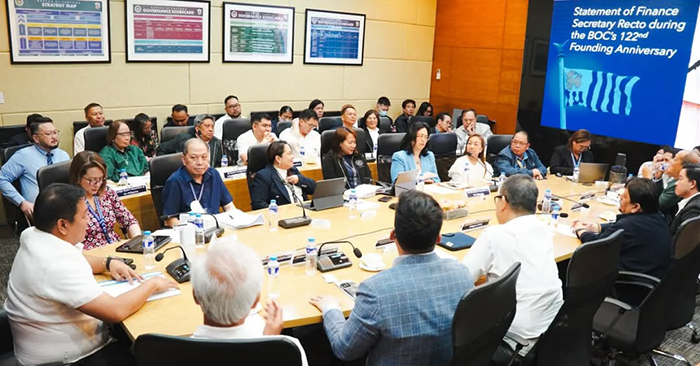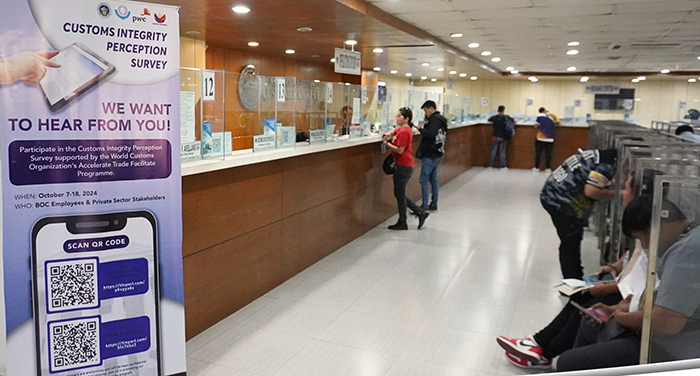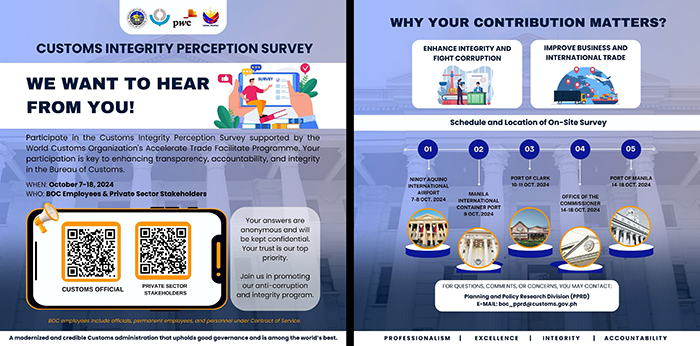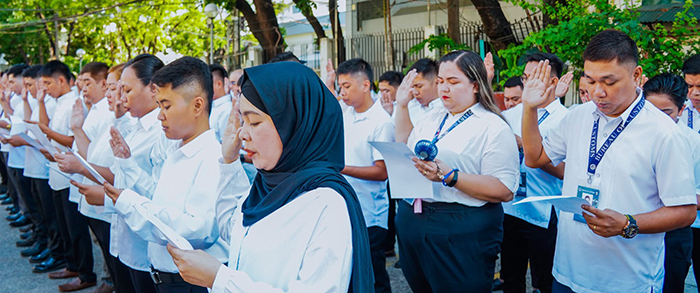Philippines Customs puts integrity at the heart of its modernization
24 June 2025
By the Philippines’ Bureau of CustomsThe Philippines Bureau of Customs (BOC) has undergone a transformative journey anchored in strong leadership, a commitment to reform, and sustained collaboration with its internal and external stakeholders and international partners. This article looks at the work done in the area of integrity, which has been a priority for the Administration in order to more effectively and transparently manage operations and reforms. BOC’s experience shows that fostering a culture of integrity requires a holistic approach, and external support can be empowering, ensuring that beneficiaries not only get the needed capacity to institute reforms, but to sustain and own them.
Laying the groundwork: early diagnostics and action planning
The current anti-corruption and integrity development programme of the BOC was developed together with the WCO Secretariat, initially under the Trade Facilitation in Middle Income Countries Programme and later under the Accelerate Trade Facilitation Programme, both of which were funded by the United Kingdom’s His Majesty’s Revenue and Customs.
The Accelerate Trade Facilitation Programme aims to foster a more business-enabling environment by supporting Customs administrations in implementing the World Trade Organization Trade Facilitation Agreement, as well as WCO instruments. Very early on, while discussing the path to take to modernize the Administration, a concrete link between integrity and reforms was established, and the need was identified to assess how the BOC’s anti-corruption and integrity promotion were perceived among its staff and external stakeholders.
To this end, in the midst of the COVID-19 pandemic, the first WCO Customs Integrity Perception Survey (CIPS) was conducted in July and August 2021, providing a baseline to guide future reform initiatives. Following the survey, a Working Group was created to conduct a diagnostic from August to September 2021 with the assistance of WCO Integrity Experts. Members of the Group came from different units of the BOC Central Office and Collection Districts. Despite the challenges and restrictions brought by the COVID-19 pandemic, they started working with key employees in small groups to discuss the key factors of the WCO Revised Arusha Declaration, using the checklist questions of the WCO Integrity Development Guide (IDG). Discussions enabled BOC and WCO experts to assess the Administration’s strengths, highlight areas needing improvement, and identify gaps.
Building on the results of the CIPS and the diagnostic, and after COVID-19 travel restrictions were lifted, the WCO experts travelled to the Philippines in May 2022 to meet their BOC counterparts for an integrity assessment validation and action planning session. Together, they drafted the BOC’s Comprehensive Anti-Corruption and Customs Integrity Development Action Plan – “Integrity Action Plan” for short (IAP) – which was approved by the BOC Commissioner for implementation in October 2022.
The Plan served as a roadmap for integrity reform, outlining clear priorities, timelines and measurable indicators. It was strategically structured to address identified gaps in policies and procedures, and ensured that these were pragmatic, realistic, rapidly effective, and capable of being evaluated. Its implementation involved regular monitoring and review processes to assess progress and adjust strategies as needed.
Keeping the momentum going: initial accomplishments under the IAP
An Integrity Development and Accountability Roadmap for 2023-2028 was also developed to establish a long-term strategy, and the IAP was incorporated into it. Some of the deliverables in the IAP were also included in the 5-Point Priority Programme of the BOC Commissioner for 2023.
In the three years which followed, significant strides were made in implementing the IAP. As of December 2024, 14 out of 40 recommendations have been implemented.
One of the IAP recommendations was the promotion of automation or computerization of Customs functions to improve operational efficiency and effectiveness, as well as reduce opportunities for corruption and inappropriate exercise of discretion. Although, after 2010, accredited importers or Customs brokers could access the BOC’s Electronic to Mobile (E2M) system to lodge import entries electronically, importers still had to submit hard copies of import documents and attachments to the Entry Processing Unit for verification, and the E2M system did not deal with permits and/or licences issued by other government agencies and had to be applied separately. As an ongoing court case prohibits BOC from enhancing the E2M, various systems independent from the E2M system have been developed to enable the digitalization of all processes. In 2023, 96.99% of processes had been digitalized (161 out of 166).
Another recommendation was to strengthen the relationship with the private sector. To this end, the BOC established the Customs-Industry Consultative and Advisory Councils (CICAC). There is a Central CICAC, which is chaired by the BOC Commissioner and consists of BOC officials and employees plus representatives of business, trade associations and organizations, and there are District CICACs in all 17 Collection Districts of the BOC, which are chaired by District Collectors. They serve as consultative bodies to the BOC management team and address existing and potential issues related to Customs and industry matters.

Since its launch in February 2024 in the presence of the Head of the WCO Accelerate Trade Facilitation Programme, the Central CICAC has been meeting monthly to discuss and resolve policy and operational issues, not only between business representatives and BOC, but also with other trade regulatory and government agencies and other stakeholders involved in the management of the international supply chain.
BOC also strengthened some of its existing policies, specifically, those dealing with employees. For example, an Equal Opportunity Policy (EOP) was adopted to ensure that the Philippine Civil Service Commission rules were duly implemented and to emphasize that opportunities in employment, advancement, benefits, rewards and recognition are accessible to all, regardless of age, gender, civil status, disability, pregnancy, religion, ethnicity, political affiliation, or socio-economic status.
Furthermore, BOC revised its Code of Conduct, providing clearer guidance on the core values and ethical standards expected of all personnel, and promoting professionalism, integrity and accountability. The Code was approved by the Commissioner in December 2024 and officially launched in April 2025.
Another completed IAP deliverable was the revision of the BOC Citizen’s Charter, which provides information about the services provided by Customs, both to external and internal stakeholders. The revised Charter now reflects BOC modernization efforts and reinforces accountability to beneficiaries.
Deepening reform: institutionalizing integrity work
One of the key recommendations outlined in the IAP was to conduct regular internal and external corruption risk analysis and assessments. However, it took some time for BOC to examine this issue as it had first to focus on the effective implementation of newly adopted measures, which was not without its challenges. These included a lukewarm reception given to anti-corruption measures from the units which had not been directly involved in their development, and a lack of institutional memory and continuity due to personnel rotation.
Another problem was the actual absence of practical guidelines for identifying and evaluating corruption risks in the BOC in terms of processes, regulations, functions, positions and offices. May 2024 saw the start of development on a Standard Operating Procedure (SOP) for the analysis of corruption risks and corruption risk mapping, again with the support of the Accelerate Trade Facilitation Programme. A series of remote capacity-building sessions brought together members of the BOC Integrity Working Group – most of whom had also participated in the WCO Diagnostic Mission in 2021 – and WCO Integrity Experts.
The SOP which was drafted focused on three critical areas for analysis: (1) regulatory and legal acts, (2) core operational processes, and (3) support and administrative processes. Going forward, the internal analysis of corruption risks and corruption risk mapping will be conducted by all offices in the BOC at least once every three years. Findings and outcomes are to be utilized for the formulation and implementation of stronger internal controls and checks aimed at addressing the root causes and predisposing factors associated with corruption risks and integrity-related violations.
Following this, six major Collection Districts were directed to establish Technical Working Groups (TWGs) to test the SOP and provide their feedback. The pilot took place from August to September 2024. It was overseen by the BOC Integrity Working Group, which was also charged with consolidating, verifying and analysing the findings, with assistance from the WCO Integrity Experts. The Group also consulted private sector representatives to include their views on corruption risks.
Thanks to the pilot, the Working Group managed to:
- Identify 127 corruption risks;
- Develop a Corruption Risk Heat Map to visualize the risks, based on the likelihood or frequency of occurrence, and the impact or consequence the risk would have if it did occur;
- Identify 37 positions vulnerable to corruption, performing 121 tasks and processes under various functional areas; and
- Formulate 40 recommendations to address risks.
A number of priority actions were then set.
First was the adoption of the SOP on Internal Analysis of Corruption Risks and Corruption Risk Mapping as a policy document. Through this SOP, BOC institutionalized corruption risk analysis and established a structured, replicable approach to regularly identify, assess and address corruption risks. This initiative also further contributed to embedding a sustainable and operational culture in the BOC.
It was also decided to conduct vulnerability tests on all policy documents to ensure they addressed corruption risks effectively. Like other Customs administrations, the BOC operates on the basis of legal acts. However, the complexity of this regulatory framework, including inconsistencies in its implementation, could potentially lead to integrity breaches and corrupt practices if not mitigated.
The pilot findings also emphasized the importance of promoting paperless trade and automation of processes to avoid risks related to Customs operations.
Finally, human resource policies – hiring and promotion, assignment and designation/rotation, and learning and development interventions – were to take into account the List of Positions Vulnerable to Corruption and use them as criteria.
The 40 recommendations addressing identified risks were incorporated into the IAP, and the updated version was approved by the BOC Commissioner in February 2025. Relevant working groups and Collection Districts are to report on its implementation on a monthly basis.
Leveraging data to verify progress and strengthen initiatives
To measure the impact of ongoing integrity efforts, a second CIPS[1] was conducted in October 2024 under the ongoing partnership with the WCO Accelerate Trade Facilitation Programme. To ensure comparability with the 2021 results, the same set of questions and the same data collection method were used. The second CIPS was well received, with the level of participation exceeding expectations and the required sample sizes.
The analysis of the answers provided by 1,607 Customs employees and 786 private sector stakeholders shows that Customs employees have a more positive perception about the efforts deployed by the Administration than does the private sector.

However, comparison of the data collected during the 2021 and the 2024 CIPS iterations reveals that the perception of the private sector representatives has improved significantly more than has that of Customs employees. When asked to “rate the level of integrity in Customs on a scale of 1-10”, with 1 being the lowest and 10 the highest, 81% answered in the range of 6 to 10 in 2024, compared with 73% in 2021. Private sector representatives’ responses overall have been more positive in 2024. For example, 89% agreed that they were “consulted in advance of Customs reform and modernization programmes”, compared with 74% in 2021. Furthermore, 86% were also “confident that in case of corruption or integrity violations, there will be an effective and fair investigation by the Customs administration”, compared to 69% in 2021.
The BOC, translating into action its commitment to transparency, and as a gesture of appreciation for the valuable input and responses from its stakeholders, presented the results of the second CIPS to the CICAC General Assembly, a gesture which was much appreciated.
While progress has been notable, BOC recognizes that more needs to be done in some areas. For example, while the percentage of Customs officers who “do not feel safe enough to report integrity violations” dropped significantly, from 42% in 2021 to just 12% in 2024, this still means that roughly one in ten officers continues to feel unsafe in speaking out. Similarly, 14% of private sector respondents declared that they “do not feel safe enough to report instances of corruption”, and 68% agreed with the statement that “it is possible not to comply with Customs requirements through the payment of bribes”, signalling persistent concerns around perceived corruption vulnerabilities.
These insights reinforce BOC’s unwavering commitment to continue deepening its integrity agenda. With continued enthusiasm and drive, the Administration is determined to build upon our progress – maximizing lessons learnt and implementing further safeguards to sustain momentum and strengthen public trust.

Maximizing lessons learnt
Looking back over its journey, BOC has identified several factors contributing to its integrity programme’s success.
The first one is the involvement of BOC’s leadership in the development and implementation of the IAP. BOC leaders participated in the high-level launch event to announce the integrity diagnostic back in 2021 and supported the implementation of the IAP, stressing the importance of integrity initiatives to achieve effective modernization, and incorporating anti-corruption and integrity development deliverables in the BOC strategic plans and priority programmes. By anchoring integrity into strategic documents, the BOC management team ensured that anti-corruption and integrity development work would transcend changes in leadership in the future.
Equally important is the engagement of staff members across different units of the organization. BOC’s top management team has changed twice since 2021, following the national elections of 2022 and 2023. Thankfully, the staff members engaged in the reform continued their work, supported by the team in charge of the WCO Accelerate Trade Facilitation Programme, helping to maintain the momentum gained. These “integrity champions”, working in the Central Office as well as the Collection Districts, ensured the implementation of the IAP in all units of the BOC. Their critical role was seen most recently in the pilot conducted on internal analysis of corruption risks.
BOC experience also demonstrates the importance of building diagnostic capacities and establishing efficient reporting and monitoring mechanisms. The ability to independently carry out internal integrity diagnostics and implement reform measures has marked a significant shift from externally driven change to institutionalized practice.
BOC also appreciates that reform does not require reinventing the wheel. It is also learning from established standards and available tools. The IDG and the Revised Arusha Declaration provide clear guidance on how to evaluate and assess the organization’s situation, perspectives on how to look at anti-corruption and integrity issues in Customs administrations, and methodologies and best practices on how to address them.
The WCO Revised Arusha Declaration and the IDG link the design of integrity strategies to the adoption of sound human resource policies. The work undertaken with the support of the WCO Accelerate Trade Facilitation Programme team also included the implementation of competency-based human resource management (CBHRM), as well as the strengthening of gender equality and diversity (GED) policies. A WCO People Development Diagnostic and a GED Organizational Assessment were conducted and, based on these, action plans were developed. Their implementation has been instrumental in promoting a transparent, inclusive and accountable Customs environment.
Measures aiming to promote GED within the Administration include the establishment of a Gender and Development Focal Point System to manage all GED activities, the delivery of training and capacity-building sessions to employees, and the integration of gender-sensitive approaches into policies and procedures.
An organization’s performance is usually based on the competencies of its employees. Therefore, one of the main tasks and challenges of human resource management is identifying and developing the competencies required to achieve the goals set by the organization. With this in mind, BOC has conducted a competency assessment and developed learning and development opportunities for its staff. This has had a tangible impact on how key functions are now delivered, including, for example, a more effective Risk Management Office.
Another defining factor was BOC engagement with economic operators through the CICAC. It enabled BOC to instil a sense of common goals and trust, which has helped both the BOC and private sector representatives to discuss things in a candid and open way, even difficult issues. Members of CICAC also participated in the focus group discussion facilitated by the WCO Integrity Experts as part of the analysis of corruption risks and corruption risk mapping. They provided valuable insights on corruption risks in the BOC, as well as some recommendations on how to address them.
Furthermore, working with the WCO Accelerate Trade Facilitation Programme has enabled BOC to improve accountability practices. Monitoring and evaluation mechanisms have been established to take stock of progress where WCO assistance was provided. Regular and open communication on accomplishments and challenges has strengthened the partnership. This has proved to be crucial during the two changes in the BOC leadership team in order to maintain a high level of commitment to the reform journey.

Sharing our experience
BOC presented its integrity reform at the WCO Integrity Sub-Committee in March 2025, at the Association of Southeast Asian Nations (ASEAN) Customs Capacity Building Working Group (CCBWG) Meeting in April 2025, and at the Accelerate Trade Facilitation Programme Focal Points Meeting in June 2025.
Feedback was extremely positive. The ASEAN CCBWG even commended BOC’s contribution, stating that “it provided a new perspective to the ASEAN”.
This article is further proof of BOC’s commitment to sharing its experience with the wider Customs community, and we hope that it inspires other administrations to look at their integrity programmes and make use of WCO tools, instruments and technical assistance.
[1] The Customs Integrity Perception Surveys (CIPS) conducted in the Philippines were structured around the ten key factors of the WCO Revised Arusha Declaration and were based on the WCO CIPS Methodological Guidelines. However, the CIPS survey questionnaires used for Customs officials and private sector stakeholders, respectively, included slight modifications to align with national operational specifics and to provide greater clarity in certain areas. While WCO Members are encouraged to adopt and adapt the survey to meet their specific national needs, it is important to clarify when a modified version is used, particularly for transparency and potential comparability across different countries, should statistical comparisons be made in the future. It is recalled that CIPS results are confidential.

